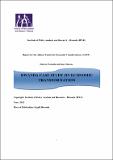| dc.contributor.author | Malunda, Dickson | |
| dc.contributor.author | Musana, Serge | |
| dc.coverage.spatial | Rwanda | en |
| dc.date.accessioned | 2015-11-30T18:16:21Z | |
| dc.date.available | 2015-11-30T18:16:21Z | |
| dc.date.issued | 2012 | |
| dc.identifier.citation | Malunda, D. and Musana, S. (2012) Rwanda case study on economic transformation: report for the African Centre for Economic Transformation (ACET). Kigali: Institute of Policy Analysis and Research-Rwanda. | en |
| dc.identifier.uri | https://opendocs.ids.ac.uk/opendocs/handle/20.500.12413/7153 | |
| dc.description.abstract | Rwanda’s economic growth over the last decade has been remarkable. With a government that is committed to achieving sustainable economic growth coupled with growth in employment opportunities for its people, Rwanda has made impressive progress in rehabilitating and stabilizing its economy to exceed pre-1994 levels. The overall economy is growing at a significant rate. The average annual growth rated in GDP was 8.8 per cent between 2005 and 2009. Rwanda’s GDP per capita has increased from less than 200 USD in 1994 to 540 USD in 2010. Although still at an early stage, the GoR has set a set path towards economic transformation in Rwanda.
There is evidence of a significant increase in private sector investment following the introduction of a revised tax code and implementation of the Doing Business reforms since 2005, although there was a downturn due to the world economic crisis in 2009. Both foreign and domestic investment have increased with FDI exceeding local investment and new jobs have been created. Exports have increased and there is some evidence of a beginning of export diversification into areas prioritised by government, as well as an increase in revenues from tourism. However, imports have also increased and so the balance of trade has worsened. Although GDP per capita and government revenues as a proportion of GDP have increased, Rwanda remains dependent on Overseas Development Assistance for about 50% of its annual budget.
Another evidence of Rwanda’s emerging economic transformation is a significant shift with respect to productivity in agriculture. There is an incipient structural shift in the mode of production away from low-productivity subsistence farming to a higher degree of market-orientation and more use of soil-enriching and yield-enhancing cash inputs. Such a transformation is fundamental for a dynamic and sustainable development and economic transformation. However, it needs to be complemented with specific measures to reverse the trend of environmental degradation and depletion of the natural resources base. The pace of agricultural transformation is important, as there will need to be measures to ensure that not only the large and medium sized farms, but also small-holders are be able take part in and benefit from this structural change. Substantial increases in production and yields in recent years are evidence of the high dividends of this structural change.
Another sign of Rwanda’s economic transformation is that development of the non-agricultural sectors of the economy has clearly begun. So far, this has been dominated by a proliferation of small-scale business and activities operating on an informal or semi-informal basis. The magnitude of this phenomenon over the past few years has been large enough to make non-agricultural entrepreneurship and wage employment a major source of new employment and income opportunities and to have quite a significant impact on the structural pattern and pace of economic growth. According to the 2011 Household Survey results, increases in non-farm wages have been one of the major drivers of the reduced poverty rates from 57% in 2006 to 44.9% in 2010/2011. It is important that this development continues, and that the business climate evolves so that the many new small-scale businesses are able to grow and increase demand for non-farm labour. This will enhance long-term economic transformation in Rwanda. | en |
| dc.description.sponsorship | African Center for Economic Transformation (ACET) | en |
| dc.language.iso | en | en |
| dc.publisher | Institute of Policy Analysis and Research-Rwanda | en |
| dc.rights.uri | http://creativecommons.org/licenses/by-nc-nd/4.0/ | en |
| dc.subject | Economic Development | en |
| dc.title | Rwanda case study on economic transformation: report for the African Centre for Economic Transformation (ACET) | en |
| dc.type | Other | en |
| dc.rights.holder | Institute of Policy Analysis and Research-Rwanda | en |


